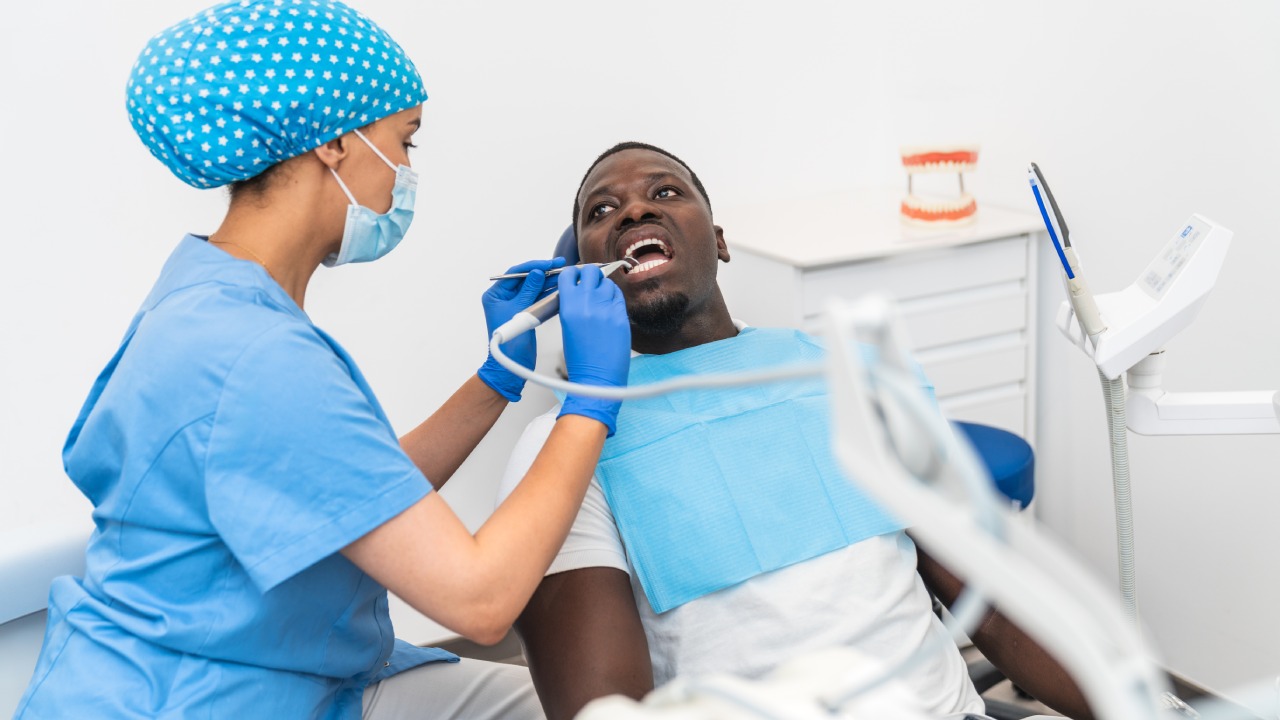Importance of Prompt Dental Care
Timely dental care is essential for maintaining not only oral health but overall well-being. When considering when to go to an emergency dentist vs. the ER, it’s crucial to understand the importance of prompt treatment.
Impact of Delayed Treatment
Delaying dental treatment can have significant effects on your physical health. Untreated dental conditions have been linked to severe health issues such as:
- Heart Disease
- Diabetes
- Respiratory Infections
- Pregnancy Complications (Source)
These conditions illustrate why prompt dental care is essential, as delays can compromise overall health.
In children, postponing dental care can result in various gum and tooth problems that can affect their overall development. Untreated dental issues often lead to more severe problems down the line, both functional and aesthetic (Source). For immediate needs, consider same-day emergency care for kids and teens.
Consequences of Ignoring Oral Health
Neglecting oral health can lead to serious complications that extend beyond the mouth. Here are some common consequences:
| Condition | Impact |
|---|---|
| Untreated Tooth Infections | Can spread to other parts of the body (emergency tooth infections: symptoms and treatment options) |
| Gum Disease | May lead to tooth loss and systemic health issues |
| Bad Breath (Halitosis) | Can affect social interactions and self-esteem |
| Visible Decay | Compromises aesthetics and self-confidence |
These consequences emphasize why it’s crucial not to ignore any oral health issues. Socially, problems like bad breath, missing teeth, and visible decay can significantly impact self-confidence and self-esteem.
For expecting mothers, delayed dental treatment can result in discomfort and eating difficulties, further complicating pregnancy (Source). This highlights the immediate need for dental care during pregnancy.
For those needing immediate care, knowing what to do if you need same-day emergency dental care and managing dental pain until you can see a dentist can help prevent further complications.
Understanding the critical nature of prompt dental care can ensure better health outcomes and prevent long-term complications. Explore our resources to know more about how emergency dentists treat tooth pain fast and common dental emergencies we treat same-day.
Common Dental Emergencies
Understanding common dental emergencies can help us determine when to go to an emergency dentist vs. the ER. Immediate attention can make a significant difference in outcomes and prevent complications.
Toothaches and Infections
Toothaches are a prevalent reason for emergency dental visits. The pain typically stems from factors such as tooth decay, infection, or damage (Modern Age Dentistry). Identifying and managing toothaches swiftly is vital for avoiding further issues.
Infections can also escalate into serious conditions if untreated. Bacterial, viral, or fungal infections may cause significant pain and lead to complications like deep space infections affecting neck and facial sinuses, or airway compromise (NCBI Bookshelf). For such emergency tooth infections, it’s essential to seek immediate care.
| Emergency Type | Common Causes | Immediate Actions |
|---|---|---|
| Toothache | Decay, Infection, Damage | Visit emergency dentist, take prescribed pain relief |
| Infection | Bacterial, Viral, Fungal | Emergency dental visit, antibiotics if prescribed |
For more details, explore our guide on emergency tooth infections: symptoms and treatment options.
Tips to Avoid Dental Emergencies
Preventing dental emergencies involves maintaining good oral health and taking precautions. Here are some tips:
- Routine Dental Visits: Regular check-ups can detect issues early.
- Proper Oral Hygiene: Brushing twice daily and flossing helps prevent decay and gum disease.
- Avoid Hard Foods: Avoid chewing on hard items like ice to prevent fractures.
- Mouthguards: Use mouthguards during sports to protect teeth from injury.
- Immediate Response to Minor Issues: Address minor dental issues promptly before they escalate.
| Prevention Tip | Action |
|---|---|
| Routine Check-Ups | Schedule regular dental visits |
| Oral Hygiene | Brush and floss daily |
| Avoid Hard Foods | Refrain from chewing ice, hard candies |
| Mouthguards | Wear during sports |
| Address Minor Issues | Consult dentist early |
For additional insights, see our article on how emergency dentists treat tooth pain fast.
Knowing the common causes of dental emergencies and preventive measures enables us to maintain oral health better. Should an emergency arise, promptly seeking professional care can mitigate risks and ensure optimal treatment. Visit [Baltimore Emergency Dental] for comprehensive emergency dental services and same-day care.
Explore more on what to do if you need same-day emergency dental care and managing dental pain until you can see a dentist.
When to Seek Emergency Dental Care
Understanding when to seek emergency dental care can be crucial in mitigating pain and preventing further complications. Here at Baltimore Emergency Dental, we offer full-service emergency dental care to address urgent dental issues promptly.
Signs and Symptoms
Recognizing the signs and symptoms that warrant emergency dental care is essential. Here are some indicators that you may need immediate attention from an emergency dentist:
- Severe tooth pain that is unmanageable with over-the-counter pain relievers
- Swelling and redness around the gums, suggesting an infection
- Persistent bleeding from the mouth
- Knocked-out or broken teeth
- Signs of infection, such as fever or pus discharge
- Difficulty opening your mouth or swallowing
For more detailed information on recognizing these symptoms, visit our signs you need emergency dental care right away section.
Emergency Room vs. Emergency Dentist
Choosing between an emergency room (ER) and an emergency dentist can be confusing. Here’s a breakdown to help you make an informed decision.
When to Visit an Emergency Dentist
An emergency dentist is specialized in handling dental issues and can provide comprehensive care for various dental emergencies. Situations that warrant a visit to an emergency dentist include:
- Unmanageable tooth pain likely caused by tooth decay, infection, or damage (Modern Age Dentistry)
- Dental injuries such as knocked-out or broken teeth
- Abscesses or severe gum infections requiring immediate intervention
- Problems related to crowns, fillings, or dental implants
Emergency dentists are equipped to perform extractions, root canals, and other specialized procedures that the ER cannot handle. For further insights, explore how emergency dentists treat tooth pain fast.
When to Go to the Emergency Room
Although the ER is generally not suited for treating dental issues, certain scenarios necessitate a visit:
- Severe, unmanageable pain accompanied by facial swelling or fever (Junior Smiles of Stafford)
- Life-threatening conditions such as fractured jaws or extensive facial trauma
- Inability to contact an emergency dentist and requiring temporary pain relief
While the ER can provide pain relief and manage infection symptoms, they are not typically equipped to conduct dental procedures such as extractions. You will generally need to follow up with an emergency dentist for comprehensive care (Junior Smiles of Stafford). For more information on managing pain while awaiting dental care, refer to our managing dental pain until you can see a dentist section.
Here’s a comparison table to help determine your course of action:
| Condition/Issue | Emergency Dentist | ER |
|---|---|---|
| Severe tooth pain | Yes (Modern Age Dentistry) | Yes |
| Dental injuries (knocked-out/broken) | Yes | No |
| Abscesses or severe gum infections | Yes | No |
| Crowns, fillings, or dental implants | Yes | No |
| Facial swelling with fever | No | Yes (Junior Smiles of Stafford) |
| Fractured jaws or extensive trauma | No | Yes |
Knowing when to go to an emergency dentist vs. the ER can save time and ensure you receive the appropriate care. At Baltimore Emergency Dental, we are ready to address your urgent dental needs, providing you with the best treatment options. Visit our article on what to do if you need same-day emergency dental care for additional information.
Pediatric Dental Emergencies
Guidance for Parents
Parents can play a crucial role in managing and navigating pediatric dental emergencies. When a dental issue arises, it can be distressing not only for the child but also for the parents. Here’s how to handle such situations with confidence and care.
Assess the Situation
First, assess the severity of the dental issue. In cases of severe tooth pain, visible swelling, or any signs of a tooth abscess, consult an emergency pediatric dentist or take your child to the ER if the symptoms are severe.
| Symptom | Action |
|---|---|
| Severe Tooth Pain | Consult emergency pediatric dentist |
| High Fever | Take child to ER |
| Facial Swelling | Take child to ER |
| Difficulty Breathing | Take child to ER |
| Visible Abscess | Consult emergency pediatric dentist |
| Broken Tooth | Visit emergency pediatric dentist |
Providing Immediate Relief
For immediate relief, especially if the pain is unmanageable with over-the-counter medications, the ER can provide temporary relief and address immediate concerns like swelling or fever. However, follow up with a pediatric dentist for specific dental procedures and comprehensive care. For more details on managing dental pain until you can see a dentist, check our article on managing dental pain until you can see a dentist.
Importance of Specialized Pediatric Care
Expertise in Pediatric Care
Specialized pediatric dental care is essential as pediatric dentists are trained to handle the unique dental needs of children. These professionals can guide parents in situations like severe tooth pain and other dental emergencies, ensuring that the child receives the appropriate treatment (Junior Smiles of Stafford).
Comprehensive Care
While emergency rooms can provide temporary relief, they typically do not have dentists on staff for specific dental procedures like extractions. It is advisable to follow up with an emergency pediatric dentist for thorough care after receiving initial treatment at the ER (Junior Smiles of Stafford). For more details on how emergency dentists treat tooth pain fast, visit our related article how emergency dentists treat tooth pain fast.
| Situation | Recommended Care |
|---|---|
| Severe Tooth Pain | ER for temporary relief, follow-up with pediatric dentist |
| Tooth Abscess | ER for severe symptoms, follow-up for specific dental treatment |
| Tooth Extraction (Required) | Visit emergency pediatric dentist |
Emergency pediatric dentists can also provide guidance to parents about dental emergencies and treatments, ensuring the health and safety of their child’s oral care (Junior Smiles of Stafford).
By understanding these elements, parents can make informed decisions about when to go to an emergency dentist versus the ER, ensuring prompt and accurate care for their child’s dental health. For more specific examples of dental emergencies, check out our section on the common dental emergencies we treat same-day.
Management of Dental Emergencies
When experiencing a dental emergency, it is important to understand the appropriate steps for managing the situation effectively. This usually involves initial care at the emergency room for immediate relief followed by comprehensive care from an emergency dentist.
ER Temporary Relief
Emergency rooms are equipped to provide temporary relief for intense dental pain and address immediate concerns, such as swelling or fever. However, ERs typically do not have dental professionals on staff who are capable of performing specific dental procedures like tooth extractions (Junior Smiles of Stafford). The main focus in the ER is to provide pain relief and prevent any life-threatening complications.
Common cases managed in the ER for temporary dental relief include:
- Severe tooth pain unmanageable with over-the-counter pain relievers
- Swelling of the face or mouth
- Fever associated with a dental infection
For these scenarios, it’s advisable to follow up with an emergency dentist for a thorough examination and treatment.
| Condition | ER Treatment Options |
|---|---|
| Severe Tooth Pain | Pain Medications |
| Facial Swelling | Anti-inflammatory Medication |
| Dental Infection with Fever | Antibiotics |
| Post-procedural Bleeding | Hemostasis with gauze or medicated pads |
For more guidelines on managing dental pain until you can see a dentist, visit our article on managing dental pain until you can see a dentist.
Follow-up Care with Emergency Dentist
After receiving initial care in the ER, it is crucial to follow up with an emergency dentist. Emergency dentists are specialized in addressing and treating dental issues that cannot be fully resolved in the ER. They are equipped to handle comprehensive care, including:
- Tooth extractions
- Treatment of dental infections
- Management of post-procedural complications like dry socket
According to Junior Smiles of Stafford, severe tooth pain that cannot be managed in the ER should be thoroughly evaluated by an emergency dentist. This ensures a complete assessment and treatment plan tailored to the specific dental issue.
| Follow-up Treatment Options | Performed by Emergency Dentist |
|---|---|
| Tooth Extractions | Yes |
| Comprehensive Infection Treatment | Yes |
| Long-term Pain Management | Yes |
| Preventive Dental Care | Yes |
For more information on the benefits of timely follow-up care, visit our articles on how emergency dentists treat tooth pain fast and signs you need emergency dental care right away.
By effectively managing your dental emergencies with initial ER care followed by comprehensive follow-up with an emergency dentist, we can help ensure better outcomes and prevent long-term complications. For in-depth tips on how to handle dental emergencies, see our guides on what to do if you need same-day emergency dental care and how to handle a broken tooth before your dental visit.
Preventing Long-term Complications
Risks of Untreated Conditions
Neglecting dental care can have significant consequences. Delaying treatment can exacerbate existing issues and lead to severe health problems, impacting overall well-being.
- Health Complications: Untreated dental conditions have been linked to serious health issues such as heart disease, diabetes, respiratory infections, and pregnancy complications. These conditions not only affect oral health but can put the entire body at risk (Golden State Dentistry).
- Advanced Dental Issues: As dental problems progress, they may require more intensive treatments. A small cavity can evolve into a painful infection necessitating root canals or crowns (Mid-County Endodontic Group).
- Aesthetic and Functional Implications: Ignoring dental problems can lead to compromised aesthetics and functionality of teeth. Missing teeth, visible decay, and gum disease can affect self-confidence and social interactions.
- Pediatric Concerns: For children, delayed dental care can result in sleep disturbances, infections, behavioral changes, weight loss, and decreased appetite. These issues can interfere with overall development (Mid-County Endodontic Group).
- Pregnancy Complications: Pregnant women who delay dental treatments can experience worsened oral health issues, discomfort, difficulties eating, and potential complications for both mother and baby (Mid-County Endodontic Group).
| Consequence | Impact | Example Conditions |
|---|---|---|
| Health Risks | Affects body’s overall health | Heart disease, diabetes, respiratory infections |
| Advanced Issues | Requires intensive treatment | Root canals, crowns for advanced cavities |
| Aesthetic Issues | Compromises appearance | Missing teeth, visible decay, gum disease |
| Pediatric Concerns | Affects child development | Sleep disturbances, infections, behavioral changes |
| Pregnancy Complications | Affects mother and baby | Discomfort, eating difficulties, potential complications |
Timely Treatment for Better Outcomes
Addressing dental issues promptly offers several advantages, not just for oral health but for overall well-being.
- Improved Oral Health: Quick intervention prevents smaller issues from becoming severe. Emergency tooth infections can be effectively treated, preventing the need for extensive procedures later.
- Aesthetic and Functional Benefits: Early treatment maintains the aesthetics and functionality of teeth, which impacts self-esteem and overall quality of life. Following our tips to avoid dental emergencies ensures optimal oral health.
- Enhanced Pediatric Care: Timely dental care for children prevents developmental issues linked to poor oral health. Our same-day emergency care for kids and teens ensures that young patients get the necessary treatment without delay.
- Pregnancy Health: For pregnant women, immediate dental care prevents potential complications. Our emergency services ensure the health of both the mother and the baby is protected.
Choosing Baltimore Emergency Dental for your emergency dental care needs ensures that you receive prompt, professional treatment. Our skilled team is equipped to handle all kinds of common dental emergencies we treat same-day, providing relief and preventing long-term complications. For more information on when to seek emergency dental care, check out our guide on signs you need emergency dental care right away.








